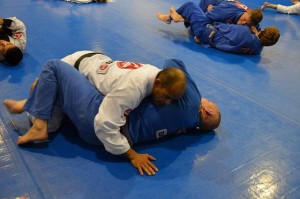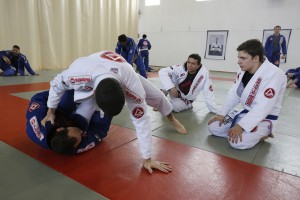A Tip To Improve Your Guard – Make Your Opponent Uncomfortable
Observing a roll between two students of similar experience, I could see that one student had a far more dangerous and difficult to pass than the second. The second student knew most of the same moves and was using the same guard games as the first, but something was missing for him. The first student was able to keep their balance and posture and fairly easily pass the second student’s guard.
What was missing? It is easy to say that one student was just better than the second, but how does that help the second student improve his guard?
It helps having the eye of your professor to watch and analyze the roll.
Read also: 3 White Belt Guard Mistakes
My advice to the second student?
I told him that he was making the grips of his various guards correctly: the hands and feet were in the correct positions. Another student watching the match would say that he seemed to be doing everything correctly.
But he was NOT making his opponent uncomfortable with those grips!
 The questions to ask is, “Are you fully utilizing your grips to make your opponent uncomfortable and unable to do what he wants to do?”
The questions to ask is, “Are you fully utilizing your grips to make your opponent uncomfortable and unable to do what he wants to do?”
Is your sleeve grip preventing his own grips on your kneees?
Is your foot on his hip really keeping the defensive distance you need?
Is your butterfly hook really threatening your opponent’s balance?
Is your collar grip really pulling the opponent’s posture forward and making him respect your choke?
Is your spider guard hook really killing the opponent’s use of his arm?
Merely taking a grip and then hoping the opponent can not pass is very different than using that same grip to control your opponent and prevent them from even getting started with their pass!
 When my own head instructor put his foot on your hip and took a sleeve grip, he used those grips to completely bend you over at the hip and threaten a triangle or a sweep. I was constantly just fighting to maintain my balance and not be pulled into a submission. I could not even start my own plan.
When my own head instructor put his foot on your hip and took a sleeve grip, he used those grips to completely bend you over at the hip and threaten a triangle or a sweep. I was constantly just fighting to maintain my balance and not be pulled into a submission. I could not even start my own plan.
You can not be passive and wait, watching what your opponent wants to do.
If you allow your opponent the time and space to get their posture and balance in your guard, what are they going to do??
They are going to pass your guard! That is what they are going to do!
When you are playing guard, you must look more closely at your various grips and hooks and ask yourself, “Am I using these grips to make my opponent uncomfortable?”
Read also: Bluebelt – Advice on Developing your Guard
Credits: Mark Mullen
Gracie Barra Black belt based in Taipei, Taiwan
Twitter: @MarkMullenBJJ
